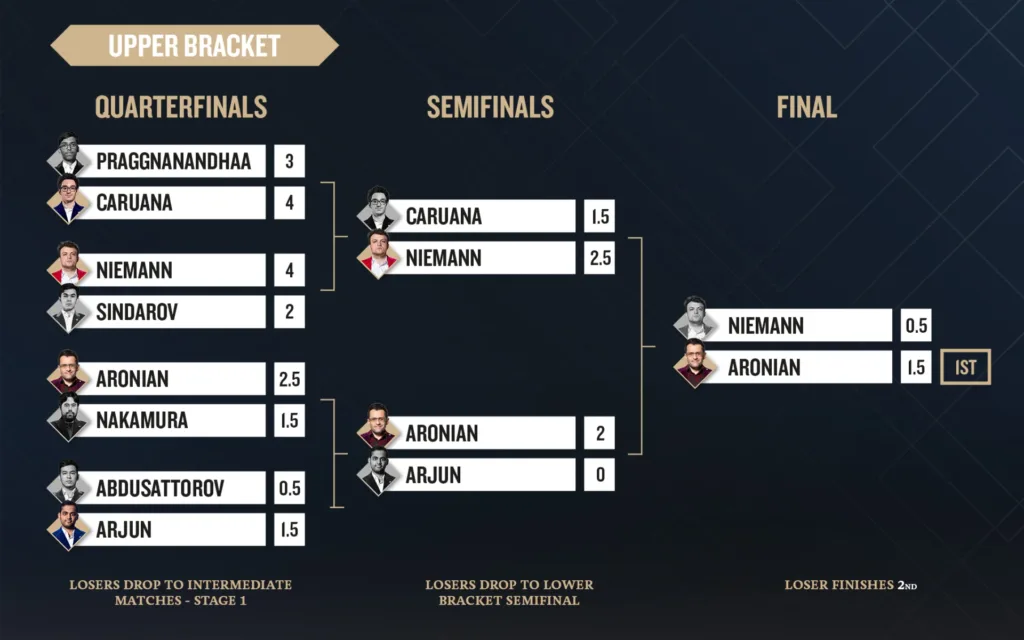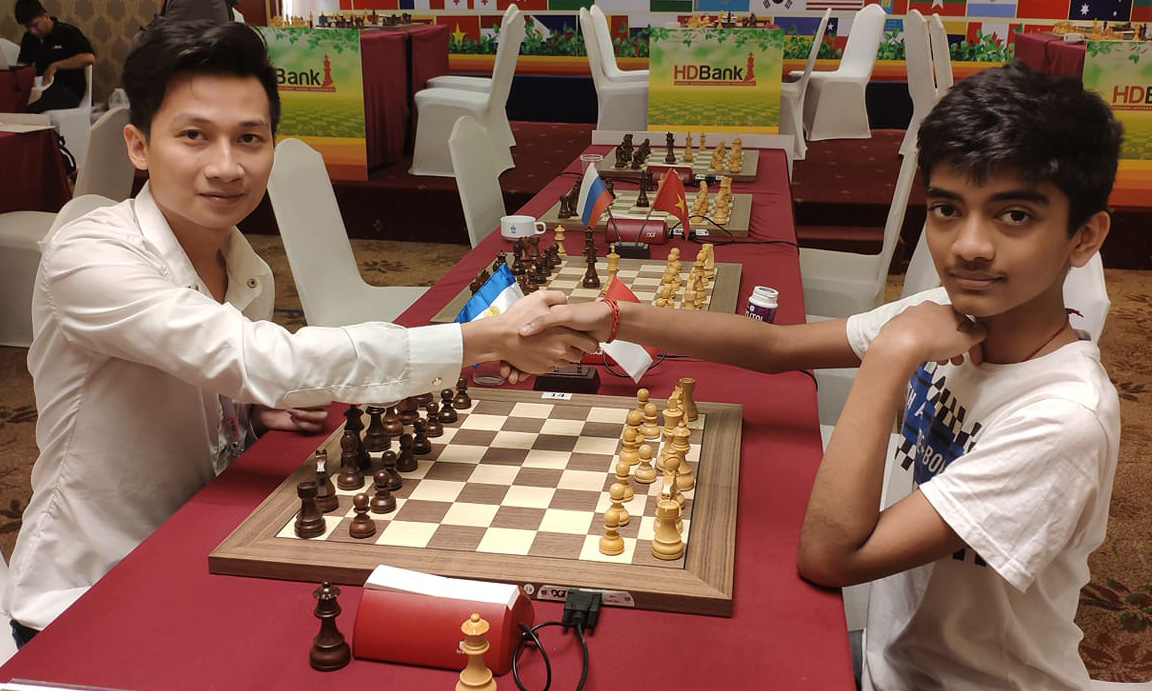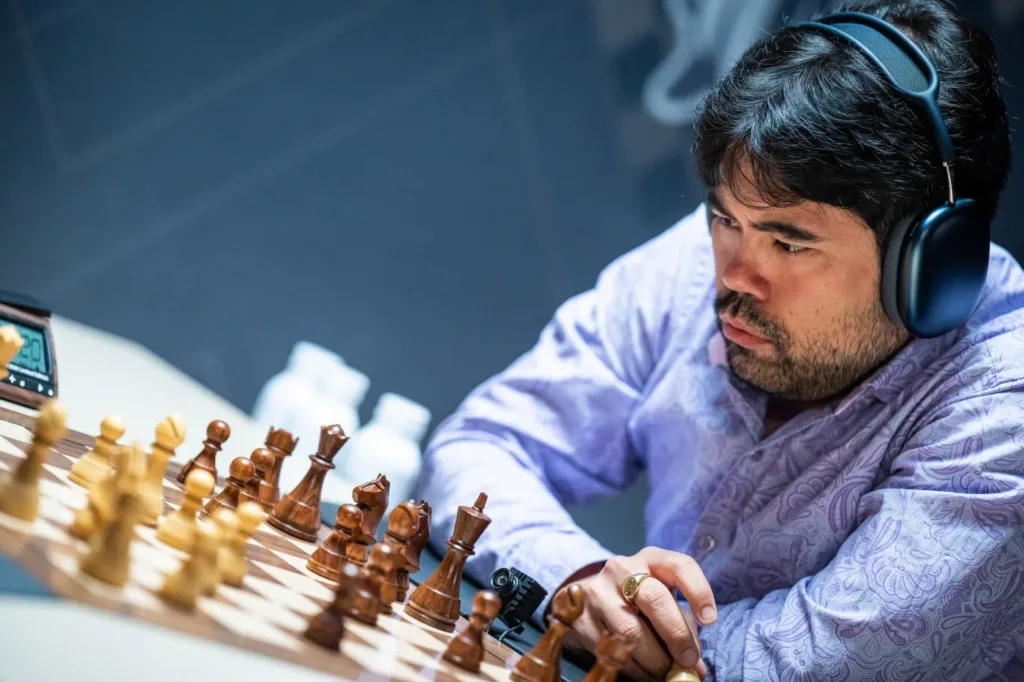Hikaru Nakamura highlights several significant problems with the Freestyle Chess Grand Slam in Las Vegas, stemming from what he perceives as a fundamental misunderstanding of professional chess and a failure to deliver on the event’s stated ambition to be a serious competitor to FIDE.
- Misleading Naming and Rebranding
- Compromised Integrity Due to Live Audience
- Ineffective and Changing Headphone Policy
- Confusing and Inconsistent Tournament Format
- Excessive Game Length and Player Fatigue
- Low Viewership and Lack of Appeal for Fischer Random
- Reinforcing Hikaru's Critique: A Fan's Perspective from the Grand Slam
Misleading Naming and Rebranding
Nakamura’s primary concern revolves around the event’s name. He argues that what is being called “Freestyle Chess” is, in reality, Fischer Random Chess or Chess960. He finds it disrespectful and inappropriate for the organizers to rebrand an existing chess variant as their own invention, especially given the rich history and established terminology in chess. He states, “The reality is it’s Fisher random chess or it’s chess 960. Pick your poison. I don’t care. It doesn’t really matter to me which one you want to call it, but that is the reality.” He believes this rebranding shows a lack of respect for chess tradition and misleads the public.
Actual Quotes:
- “When we play this game it’s Fisher random chess or it’s chess 960. I don’t really care if if you if if you don’t like it or whatever you don’t like the names that’s fine but that doesn’t really give you the right to go and suddenly start calling it something different.”
- “They’re suddenly calling it freestyle chess. Like there was this chess event with basketball players which was of course Fisher random or chess 960 with the random setups and they’re calling it freestyle chess. Like this is some new thing. The reality is it’s Fisher random chess or it’s chess 960. Pick your poison. I don’t care. It doesn’t really matter to me which one you want to call it, but that is the reality.”
- “Don’t suddenly pretend that like Fisher random chess or chess 960 is suddenly freestyle chess like rebranding something that you really don’t have the right to that wasn’t like your invention or your creation.”
Check out this article to know why they used the name Freestyle Chess other than Fischer Random or Chess960.
Compromised Integrity Due to Live Audience
Nakamura strongly objects to having a live, in-person audience for a high-stakes professional tournament. He emphasizes that the significant prize money ($200,000 for first place, $140,000 for second) makes the event a serious competition, not just an exhibition. The presence of an audience, with their gasps, sounds, and potential distractions like phone rings, compromises the integrity and fairness of the games. He recounts instances where players, including himself and Fabiano Caruana, were distracted by audience noise. He believes that live viewership with ticket sales is only suitable for “pure entertainment” events where the stakes are lower and players understand the casual nature.
Actual Quotes:
- “When you have an audience and people see the games in real time and they might gasp, they might snore, their phone might go off, it is very distracting to the players.”
- “From a general standpoint of integrity and fairness, that should not happen. The players should not be able to see that, hear that, any of those things at all.”
- “You can only really do that if an event is truly uh is truly uh an entertainment event and not trying to blend entertainment with a professional event. You can’t do it because I think the stakes are too high and things are going to happen that are frankly inappropriate.”
- “Fabiano got distracted in his game against Praggnanandhaa or or his game against me. We heard these gas were low on time.”
- “I don’t really believe that the live live viewership can be done for professional events… you can have these sorts of events, but you cannot have it with a high-end professional event.”
Ineffective and Changing Headphone Policy
Adding to the issue of audience distraction, Nakamura criticizes the organizers’ handling of the headphone policy. Despite a lengthy player meeting where no clear resolution was reached, players were initially given options (white noise, music, or no headphones). However, these rules changed on the fly, with Nakamura being told he had to wear headphones but couldn’t have music, contradicting prior agreements. Furthermore, he asserts that the noise-canceling headphones provided were “pure theater” and did “absolutely nothing at all to protect the integrity of the game,” as he could still hear audience reactions and phones ringing. This demonstrates poor organization and a lack of understanding regarding player needs in a professional setting.
Actual Quotes:
- “We have this big long meeting of 1 hour and nothing gets resolved.”
- “On the next day when I play Levon, to my horror, I’m suddenly told uh actually let me back up. So there all these conversations and my stance was simply this. Either no headphones like basically the situation remains where no headphones same as qualifying day or if you require me to wear wear headphones, I want it with music. And the organizers basically agreed… Then the day I play Levon, suddenly I’m told, ‘Well, you have to wear headphones, but no, no, no, you can’t have music.'”
- “To me, this was just frankly unacceptable and it shows how poorly organized the entire event was.”
- “The headphones were just pure theater. they did absolutely nothing at all to protect the integrity of the game… They didn’t block out anything. I mean they were ve they made a very very marginal difference but nothing nothing special.”
- “I heard a phone go off. Uh I had the the noise cancelling headphones beeping on and off during my first game… I could hear the gas when I played Levon and I blundered… I could hear the gas multiple times when I played Fabiano.”
Confusing and Inconsistent Tournament Format
The tournament format itself is a major point of contention. Nakamura describes it as “completely out of control” and a “busted double elimination bracket.”

Illogical Bracket System
- Actual Quotes: “The problem is they did the same thing. So from 16 you go to eight. The only difference is unlike in the past, if you don’t finish in the top, if you finish in the bottom eighth, 9th through 16th, somehow you’re magically in the running to play for third place, meaning that you can suddenly win all your matches and get back into third. Um, so this makes absolutely no sense to me whatsoever.””It’s basically a busted double elination bracket where people don’t have a chance to come all the way back and play for first place. In my view, that’s insane.””Many people struggle to even understand how this worked. There are players like Fabiano Caruana or Vincent Keymer who said things to me where it’s like basically they just know they have to play, but they don’t even know the time control or anything else.
Incorrect Brackets Displayed
- Actual Quotes: “I look at the bracket. I do my recap on YouTube and I tell everybody that I’m playing against Praggnanandhaa because the bracket literally has me playing against Praggnanandhaa. The bracket both on chess.com has me playing Praggnanandhaa and the bracket on the freestyle website itself has me playing against Praggnanandhaa. Um, but I get told, ‘No, no, no, no. Chess.com made a lot of mistakes and um and they’ve got the bracket wrong.’ But when your own website, your own website of the official, the official website of the event has the bracket wrong too, that probably means there’s something wrong with your bracket and there’s something wrong with the format and you need to think about that.””To think that you have a perfect system and everybody else is just an idiot. to me that’s just really really bad.”
Erratic Time Control Changes
- Actual Quotes: “When I started playing in the uh playing in in the once I did the qual the qualification was 10 minutes plus 10-second increment… But then when you reach the next stage of the qualification, suddenly the games that I play against Levon Aronian are with a 30 minute time control and 30 seconds per move. So suddenly you go from playing 10 + 10 to 30 plus 30.””No, I’m playing 30 plus 30 again Dominguez… And then what happens? Suddenly, out of nowhere, after winning against Lennir, after playing 30 plus 30 against Levon and against Dominguez, suddenly I go to playing 10 plus 10 against Wesley and Fabiano. Now, this of course is again completely illogical.””This was also just absurd to me, the the shifting of the time controls, you know, considering that I feel like there are people from chess involved. I thought it was really really bad.”
Excessive Game Length and Player Fatigue
The combination of long time controls and a convoluted bracket system led to excessively long playing days. Nakamura recounts playing for eight and a half hours, while Fabiano Caruana reportedly played for 11 hours in a single day, including multiple tiebreakers and Armageddon games. Nakamura considers this “absolutely unacceptable” for a professional event, as it leads to severe player fatigue and likely impacts game quality.
Actual Quotes:
- “The days were simply way too long.”
- “When you have these 30 minutes plus 30 games, you play two of these grueling games and I had two very long grueling games against Leavonne. And then I had to play a tiebreaker. And I played for like n I played for eight and a half hours I think.”
- “Fabiano actually went all the way through multiple tiebreers to Armageddon. And Fabi told me he played for something like 11 hours. Like when his Armageddon game against Praggnanandhaa ended, they had played 11 hours of chess. And that is just absolutely unacceptable. Period. It’s just completely unacceptable. It should just never happen.”
Low Viewership and Lack of Appeal for Fischer Random
Finally, Nakamura touches upon the viewership numbers, suggesting that “Freestyle Chess” (Fischer Random/Chess960) simply does not attract the same audience as traditional chess. He believes that beginners and casual fans are less interested in random starting positions and prefer the historical context and established openings of standard chess. He cites Levy Rozman (GothamChess, a popular chess streamer) agreeing that a regular chess tournament in Las Vegas would likely have been a greater success in terms of viewership. Nakamura concludes that while the in-person fan experience was a positive, it came “at the cost of the players,” and that the event’s ambition to be a FIDE competitor is undermined by these fundamental flaws.
Actual Quotes:
- “At the end of the day, you know what people want to see? They want to see regular chess.”
- “If you’re a beginner, you’re a weaker player, you do not want to see these random positions where you have bishops on squares that make no sense, knights in the edge of the board. You don’t want to see that. That’s not what you want to see.”
- “The viewership very clearly has shown that over the last couple of tournaments. Um, it’s very, very clear that that’s the case.”
- “Levy even said it to me. Levy himself, you know, you know what Levy said to me when I was having a conversation with him the other day? He literally said he thought that if they had run this exact same tournament, but it was reg but it was regular chess, it probably would have been a success in Las Vegas.”
- “When I look at the you look at Levy’s viewers on his videos, you look at my viewership on my recaps of this stuff, it just is not the same as regular chess.”
- “How is that going to make it more interesting for people? How is how are more people going to suddenly watch the event when you when you basically just confuse everybody even more? I mean, the players themselves didn’t know didn’t didn’t even really understand what was going on.”
Reinforcing Hikaru’s Critique: A Fan’s Perspective from the Grand Slam
Hikaru Nakamura’s detailed critique of the Freestyle Chess Grand Slam finds significant corroboration in the testimony of an attendee, offering a critical on-the-ground perspective that strengthens the Grandmaster’s arguments. This fan’s experience highlights that Nakamura’s concerns were not isolated, but rather indicative of systemic issues impacting both players and the integrity of the event.
The fan’s agreement on the “Freestyle Chess” naming issue is immediate and strong: “Completely valid, it bothers me as well, and just rebranding to make some flashy name is a little crazy.” This reinforces the sentiment that the organizers’ naming choice was a misstep, disrespectful to established chess tradition and a transparent attempt at novelty over accuracy.
Perhaps the most alarming corroboration comes regarding the compromised playing environment. The fan’s personal observations underscore the chaos described by Nakamura, noting the “absolutely insane” lack of strict enforcement for audience quietude. The revelation that fans had “wide open avenue…to just make noises” and were not “explicitly told we had to be quiet” points to a profound organizational oversight. The anecdote of a fan interrupting live commentary by asking questions of Tania Sachdev and Vidit Gujrathi on air serves as a striking example of the unchecked environment that undermined the professional atmosphere Nakamura advocated for. This direct observation validates Nakamura’s assertion that the event failed to separate entertainment from serious competition, to the detriment of the latter.
The inconsistent headphone policy also draws the fan’s incredulity. “It is crazy that this was put onto the players (and not on the playing stages not receiving noise),” they write, highlighting a perceived reversal of responsibility. The visible discrepancy among players, with “some wore headphones, some didn’t,” further solidifies Nakamura’s claim that the policy was poorly enforced and created an unfair playing field where those without headphones could potentially gain an advantage by hearing audience reactions.
A point that clearly resonated with the fan, and which speaks volumes about the organizers’ integrity, is the deletion of Fabiano Caruana’s critical interview. The fan’s strong reaction—”Absolutely fucking insane, and disgraceful to the freestyle organization to take down anything criticizing their event”—echoes Nakamura’s disappointment and suggests an attempt to suppress dissenting opinions, further questioning the transparency and professionalism of the event.
While the fan’s perspective on the “busted bracket” is slightly more lenient, acknowledging that “it’s not THAT insane to have double elimination except for the top prize,” they firmly agree with Nakamura on the illogical time control system: “Time control system was actually insane, there was no reasonable way to determine what takes 10:10 and what takes 30:30. It seems like it was done more to accommodate the schedule they wanted, as opposed to fair and logical play.” This corroborates the perception that player comfort and fair competition were secondary to an arbitrary schedule.
Interestingly, the fan disagrees with Nakamura’s view that Fischer Random is inherently less interesting than standard chess for viewers, noting a “family friend who is pretty much brand new to the chess viewing world, and he actually enjoyed the chaos that started from the beginning.” However, they emphatically concur that “Fans were the real winners,” recounting numerous surreal interactions with top players. This aligns with Nakamura’s observation that while the fan experience was positive, it was achieved at the cost of the players’ professional environment. The fan’s perspective thus provides a vital external validation for many of Nakamura’s key criticisms, moving them beyond subjective opinion to demonstrably experienced problems.

I’m Xuan Binh, the founder of Attacking Chess, and the Deputy Head of Communications at the Vietnam Chess Federation (VCF). My chess.com and lichess rating is above 2300. Send me a challenge or message via Lichess. Follow me on Twitter (X) or Facebook.


4 thoughts on “Hikaru Nakamura Exposes Major Flaws in “Freestyle Chess” Las Vegas Tournament”
Comments are closed.